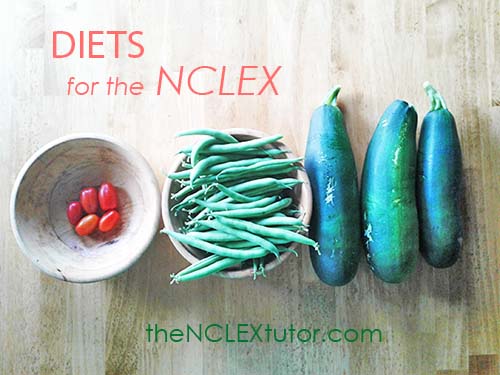Diets for the NCLEX exam is an important topic. I also include the most common foods that contain the electrolytes, vitamins, and minerals. Each diet is therapeutic depending on what disease the client has. Here are the most common.
This post was updated June 4, 2020.

The Diets
- NPO diet
- means “nothing by mouth”, no food or water
- before some diagnostic tests and surgery
- common after abdominal surgery until bowel sounds come back
- Clear liquid diet
- common after surgery
- gelatin, hard candy, broth, coffee and tea, popsicles
- Full liquid diet
- after surgery and when client can tolerate more
- ice cream, milk, pudding, fruit and vegetable juice
- Regular diet
- no restrictions
- Soft diet
- for those with difficulty chewing and swallowing
- food needs to be mashed or chopped like mashed potatoes
- Thickened liquids
- fluids are thickened with a substance for those with difficulty swallowing
- common for those with stroke/CVA
- Fluid-restricted diet
- with heart failure or renal failure
- 1000 mL, 1500 mL, or 2000 mL maximum of fluids allowed per 24 hours
- Renal diet
- low in fluids, electrolytes, and proteins
- body can’t get rid of extra water or toxins from breakdown of protein and electrolytes
- Liver/hepatitis/cirrhosis diet
- low in protein (if ammonia levels are high)
- body can’t get rid of toxins from protein
- low in protein (if ammonia levels are high)
- Low purine/uric acid diet
- avoid purines with gout
- foods with purines are protein/meat, some fish, beer/wine, sweetbreads
- can increase uric acid level and make gout worse
- Cardiac diet
- low fat, low cholesterol, low sodium; high in fruits, veggies, whole-grains
- Fat-restricted diet
- with malabsorption diseases like pancreatitis, gall bladder disease and GERD
- fat causes release of enzymes/bile that exacerbates disease
- Diabetic diet
- low in sugar and carbs
- Low fiber diet
- for inflammatory bowel diseases
- low fiber prevents diarrhea
- High fiber diet
- for constipation
- High calorie, high protein
- for debilitating diseases like cancer, burns, and COPD
- they need the extra calories because their body burns off calories quickly
- Sodium restricted diet
- for hypertension, heart failure, renal disease, heart disease
- Gluten free diet
- celiac disease and gluten sensitivity
- no BROW: barley, rye, oats, wheat
- instead eat corn, rice or millet
- Low tyramine diet
- avoid high tyramine foods when taking MAOIS (psych meds) and some tuberculosis meds
- tyramine foods are aged foods like aged cheese, smoked, cured or processed meat like sausage, coffee/tea (drinks with caffeine), soy sauce and beer/wine
- can cause a hypertensive crisis if taken together
- Vegetarian diet
- no meat
- Vegan diet
- plants only
Breakdown of Foods
Try to break foods down into these groups:
- Carbs
- sugar and starches
- mostly grains: but also milk, fruits, vegetables
- whole grain carbs are good for you like oats and brown rice
- refined carbs are bad for you like cookies and cake
- too many refined carbs increases risk of heart disease and diabetes
- Fats
- good fats: unsaturated like olive oil and nuts
- bad fats: saturated like butter, fat from red meat
- too many bad fats increases risk of cardiac disease
- Proteins
- meat, dairy, beans & rice
- good for healing
Vitamins
- Folic acid/Folate
- dark green leafy vegetables, meat, legumes, nuts and eggs
- prevents neural tube defects and folate-deficiency anemia
- Vitamin C
- citrus fruits (oranges, orange juice), strawberries
- good for healing
- Vitamin D
- fortified milk and cereals
- good for absorption of calcium
- Vitamin K
- green leafy vegetables
- is the antidote to warfarin
- Vitamin B12
- protein such as beef, liver, chicken, and fish
- dairy, eggs
- prevents B12-deficiency anemia
Electrolytes/Minerals
- Calcium
- collard greens, broccoli, kale, canned fish, dairy products like milk and cheese
- good for preventing osteoporosis
- Sodium
- “salty things”, bacon, canned food, processed food, table salt, bread, soy sauce
- low sodium for a cardiac diet
- too much sodium can lead to excess fluid in body (FVO)
- Magnesium
- avocado, nuts, legumes, tofu
- good for muscle and nerve function
- Potassium
- bananas, oranges, tomatoes, potatoes, spinach
- need low potassium for a renal diet
- good for cardiac and muscle function
- Phosphorus
- meat, dairy, nuts
- good for bone/teeth formation, and for making proteins
- Iron
- meats, lentils/beans, egg yolks, spinach, dried fruit
- good for preventing iron-deficiency anemia
- eat with vitamin C for better absorption (OJ and strawberries)
Random Food Info
- Foods with a cross-sensitivity to latex:
- banana, avocado, kiwi, papaya, fig, potato, tomato
What diets do you come across at your job? Post them below!
Find it helpful? Please share it!
I appreciate the breakdown
Highly insightful. Thank you.
Pescatarian Diet
. fruits, vegetables, grains, legumes, and seafood.
That sounds like one of the healthiest diets! I don’t think doctors are “prescribing” that diet, but as nurses we should probably be aware of it. Thanks Kelly!